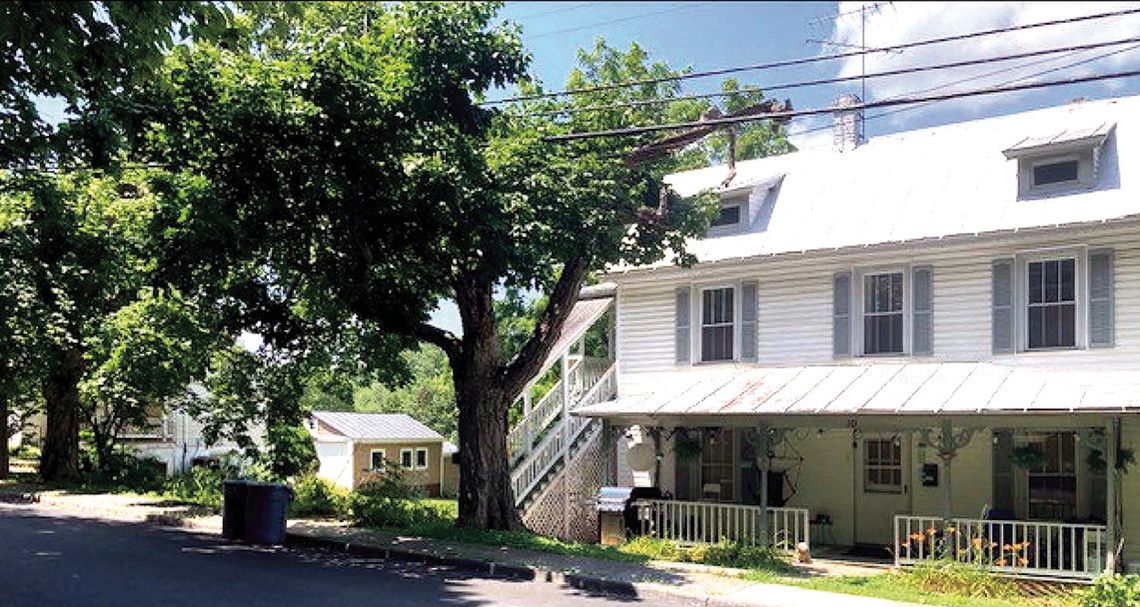The Lexington City Planning Commission last week held a public hearing on a proposed educational facility on North Lewis Street, with discussion primarily focused around the classification of the facility.
Members of the Commission felt that the proposed facility fell more in line with the definition of a family home daycare facility found in the city code. As a result, though a vote was held to approve it under that definition, a new public hearing has been scheduled for the Commission’s next meeting.
Lorelei Pisha applied for the conditional use permit to operate the House Moun- tain Learning Cooperative, a homeschool cooperative comprised of eight families throughout Rockbridge County, at the residence located at 10 N. Lewis St.
The house is a duplex owned by Jonathan Pisha, the father of Lorelei’s daughters, Georgette and Seren. Jonathan lives on the lower level of the house, while the learning cooperative will operate out of the upper floor of the home.
The cooperative will service no more than 12 children between the ages of 8 and 12 and will operate between 10 a.m. and 2 p.m. for three days a week, except in cases of extended inclement weather. The rest of the week would be comprised of education at an outdoor immersion program in Collierstown and field trips. They plan to follow the Rockbridge County Public Schools schedule, including school closures, as the majority of the families in the cooperative live in the county, not in Lexington.
Lorelei Pisha gave a presentation to the Commission about the cooperative and their offerings and plans, along with Ann-Bailey Lipsett, who is one of the teachers for the cooperative. Both Pisha and Lipsett have children with unique requirements around their education whose needs they felt weren’t being adequately met by the city’s public school system. They initially enrolled their children in Earthsong, a cooperative similar to the one they are looking to start, but earlier this year Earthsong announced they were no longer able to offer services for upper elementary students.
“[Jonathan and I] are both working parents, so homeschooling by ourselves is an insurmountable thing, but we also want to make sure she has social opportunities,” Pisha said. “We really believe in the 21st century skills where you learn to problem solve together and you learn how to cooperate and communicate and that kind of thing, and she can’t get that by herself. … What we’d like to be able to do is pull together a group of families in this location a couple of days a week, with structured learning on those days.
“We want to be able offer this to other people in the community who otherwise wouldn’t be able to homeschool because they’re both working parents, or have children like ours, whose parents thought public schools would be great but something’s not fitting right now and they need that alternative,” Lipsett added. “We are able to offer programming to both typical and atypically developing students.”
Commission member Leslie Straughan commented that, given the parameters of the proposal, the facility fit the definition of a family home daycare facility better than the definition of an educational facility. A family home daycare facility is defined in the city code as “a single-family dwelling in which more than four but less than 13 individuals, are received for care, protection and guidance during only part of a twenty-four-hour day.” Straughan was particularly concerned with the limited parking on site if the facility were classified as a school.
“If we try to call it a school, I find it hard not to require parking on site, at least for the staff,” she said. “I don’t know that we’ve ever [allowed that]. ... Part of what makes this different is that it’s temporary, but if we use this other definition, I wouldn’t have a problem if they used it more long-term.”
The property has no offstreet parking, though there is 180 feet of space along the street in front of the property, which Pisha said equated to “five-to-six parking spaces.” Part of the space would be reserved for the pick-up/ drop-off area, which would leave space for four cars to park in front of the house, adding that, while that was enough for the staff for the facility, the teachers were okay with parking off-site to avoid limiting street parking.
The biggest potential competitor for parking in front of the facility, city planner Arne Glaeser noted, was Washington and Lee’s Sigma Nu fraternity house, which is located across the street, but it has its own off-street parking.
As for the definition that best fit the type of facility, Glaeser told the Commission that he leaned toward classifying it as an educational facility due to the education component of the proposal. He noted that family home daycare facilities are also permitted in R-1 zoning districts with a conditional use permit, so the process for approving both would be the same, provided the new definition was not more restrictive than the original.
“I don’t think there will be much difference, really, if you call it a family home daycare or an educational facility,” he said.
Neither Pisha or Lipsett objected to the facility being approved as a family daycare facility.
The Commission voted 5-0 to approve the conditional use permit with the facility being classified as a family home daycare rather than an educational facility, with Commission member John Driscoll and newlyappointed chair Pat Bradley absent.
Prior to the vote, there was discussion about whether or not the conditional use permit needed to be readvertised, with Straughan moving to approve the permit, pending a ruling from City Attorney Jeremy Carroll on whether a second public hearing was necessary.
On Tuesday, the planning office confirmed that they readvertised the public hearing, with both uses – educational facility and family home daycare – listed. That hearing will be held at the Planning Commission’s Aug. 24 meeting.
.jpg)



